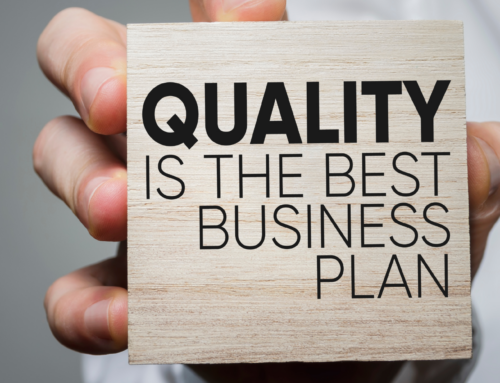Factory Audits: Taking preventative actions to evaluate and qualify high-quality suppliers
Is your company considering a new supplier? Are you worried that your product isn’t being produced at your supplier’s highest performance? Do you have concerns about the integrity of your current supplier, or perhaps you’re interested in understanding their processes and procedures? These are only a handful of reasons why companies are choosing to conduct routine supplier audits. Audits play a critical role in the success of your company. Whether your supply chain is running smoothly or you’re looking to eliminate high-risk concerns, auditing suppliers is an essential process for maintaining relationships with customers, ensuring high-quality products, and protecting your company.

June 29, 2021
![]()
The BIG Picture
When companies are looking for new suppliers, the process can be pretty intimidating. There are many boxes to check before making the commitment and inviting this potential supplier into your supply chain. In order to ensure your supplier is a positive reflection of your company, establishing processes and procedures at the beginning of your relationship is essential. Searching for a suitable supplier that aligns with your company’s values may seem daunting; however, it is possible. Many suppliers want to work with companies who have high expectations and expect high quality because they’re just as passionate about their products and processes as you are.
Initially, audits can be used to understand the “big picture” of your new supplier. Additionally, before intermingling your potential supplier into your supply chain, be sure to use this time to thoroughly investigate potential risks or complications that could cause disruptions. Being that your company has never worked with this supplier before, conducting a rigorous initial audit will assist in communicating your expectations while simultaneously conducting an unbiased evaluation of their systems and processes.
![]()
Which Supplier Audit Benefits Your Company the Most?
Fortunately, there isn’t a “one-size-fits-all” when it comes to supplier audits. Various audits have been developed to adhere to many different aspects of quality and processes. While some companies may use audits to qualify suppliers to produce a specific product, other companies may be auditing their suppliers to ensure compliance and proper workplace environment processes and procedures are being met. In any event, supplier audits are a critical assessment to provide companies the facts. To put it simply, companies expect transparency with their suppliers and use audits to acquire the truth.
When conducting these audits, the quality team you are working with must understand the various regulations and compliance laws of your supplier’s country, as well as the product’s destination. Quality assurance teams should be adequately trained and qualified through education and experience. If you choose to work with a third-party auditing team, ensure you understand their duties, capabilities, and qualifications.
![]()
Common Supplier Audits
“GMP” Good Manufacturing Practices Audit
Is your company looking to qualify a potential supplier specifically to produce your product? Within this particular type of supplier examination, auditors will run through a series of checks that evaluate a supplier’s quality management system (QMS). The benefits of having a good QMS? High-quality products, production efficiency, and adherence to regulatory requirements. Having a good QMS affects every aspect of a supplier’s performance.
GMP audits are another great way to ensure your current supplier is continually improving their practices. While there are many reasons for companies to conduct GMP audits, this particular auditing process dives into each aspect of production, from start to finish. Within these on-site assessments, quality assurance teams observe production capabilities, internal quality controls and ensure that efficient systems and processes are the best fit for your supply chain.
How Can HB International Assist You?
Our Quality Assurance team regularly educates themselves to ensure our customers receive the utmost care and highest quality from our suppliers. Our team works directly with our suppliers through our on-site auditing procedures and observe firsthand the daily processes and procedures that our suppliers are capable of. From basic sanitation requirements for food and medical manufacturing to FDA registration, our team is equipped with the knowledge to ensure suppliers are transparent and working efficiently. From ISO 9001 (Quality Management Systems), ISO 22000 (Food Safety Management), FSSC 22000 (Food Safety System Certification), to BRCGS (Food Safety Audits Certification), we’re here to ensure quality and good manufacturing practices are followed every day.
Social Compliance Audit
While GMP focuses on the processes and procedures of manufacturing, social audits are conducted to observe how well a supplier complies with laws and specific labor standards. Companies use social audits to monitor a supplier’s working conditions and ensure the safety of worker performances. Social audits are used to observe the behaviors of a facility’s employees and identify opportunities where working conditions or living conditions may need to be further investigated. Social audits have the potential to reveal situations that can be highly detrimental to a company’s image. Examples of opportunities for such risks are discrimination, work environment safety concerns, forced or underage labor, harassment and/or abuse, extensive work hours.
Today, many companies are engaged in international sourcing as a way to strengthen their business opportunities. Having the ability to trust and rely on your suppliers is crucial. Suppliers have a significant impact on your brand, which is why managing social compliance risks and observing factory working conditions is such a critical component to your company.
How Can HB International Assist You?
Routine visits and annual audits are what we consider “the norm.” We pride ourselves on conducting in-person audits and know that it provides our customer’s relief in knowing their suppliers are continuously monitored for quality, capability, GMP, and social compliance. Detailed comprehensive reports are provided to you, our customer, to ensure you receive an accurate evaluation of your supplier(s). It is our responsibility to protect your business and your supply chain.
Environmental Audit
Today, more than ever, companies are looking to improve their impact on the environment. As we continue to become more educated and more aware of how our choices’ impact on the environment, consumers look towards those companies that portray similar values.
Quality assurance teams are working to conduct environmental audits, which are used to minimize a supplier’s environmental impact. Eco-conscious companies are integrating these audits into their routine procedures to ensure their suppliers are educating themselves on ways to become more environmentally friendly and working to comply with local, regional, and national environmental regulations.
Qualifications through ISO 140000, the International Environmental Management standards, provide suppliers and quality teams opportunities to understand the criteria specifically targeting environmental management systems. Those who are trained and educated in this field are equipped to identify the impact a supplier or product has on the environment. For example, these audits provide companies and suppliers with various options to reduce waste, dispose of waste, and identify opportunities for increased environmentally responsible processes and procedures.
How Can HB International Assist You?
Our team values our relationships with our customers and our suppliers. Your image is our priority. We work together to cultivate a robust and trustworthy relationship to take care of all parties involved. Auditing suppliers doesn’t need to be intimidating when you are working with a team of quality experts.





